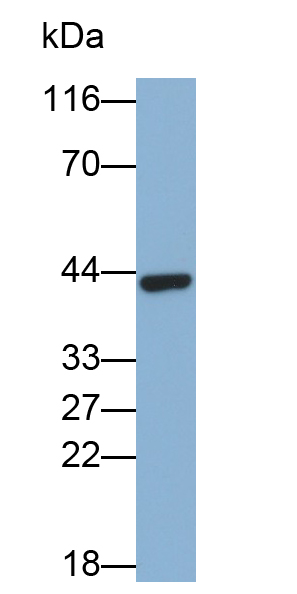Monoclonal Antibody to Chitinase-3-like Protein 1 (CHI3L1) 

GP39; CHI3-L1; YKL40; Chondrex; Chitinase 3-Like 1; Chondrocyte Protein YKL40; 39 kDa synovial protein
Overview
Properties
- Product No.MAB463Hu22
- Organism SpeciesHomo sapiens (Human) Same name, Different species.
- ApplicationsWB
If the antibody is used in flow cytometry, please check FCM antibodies.
Research use only - Downloadn/a
- CategoryMetabolic pathwayInfection immunityBone metabolismRheumatology
- SourceMonoclonal antibody preparation, Host Mouse
- Ig Isotype IgG1Kappa, Clone Number C4
- PurificationProtein A + Protein G affinity chromatography
- LabelNone
- Immunogen RPB463Hu01-Recombinant Chitinase-3-like Protein 1 (CHI3L1)
- Buffer FormulationPBS, pH7.4, containing 0.01% SKL, 1mM DTT, 5% Trehalose and Proclin300.
- TraitsLiquid, Concentration 1mg/mL
Sign into your account
Share a new citation as an author
Upload your experimental result
Review

Contact us
Please fill in the blank.
Specifity
The antibody is a mouse monoclonal antibody raised against CHI3L1. It has been selected for its ability to recognize CHI3L1 in immunohistochemical staining and western blotting.
Usage
Western blotting: 0.01-2µg/mL;
Optimal working dilutions must be determined by end user.
Storage
Store at 4°C for frequent use. Stored at -20°C in a manual defrost freezer for two year without detectable loss of activity. Avoid repeated freeze-thaw cycles.
Stability
The thermal stability is described by the loss rate. The loss rate was determined by accelerated thermal degradation test, that is, incubate the protein at 37°C for 48h, and no obvious degradation and precipitation were observed. The loss rate is less than 5% within the expiration date under appropriate storage condition.
Organism Species More: Sus scrofa; Porcine (Pig)Giveaways
Increment services
-
 Antibody Labeling Customized Service
Antibody Labeling Customized Service
-
 Protein A/G Purification Column
Protein A/G Purification Column
-
 Staining Solution for Cells and Tissue
Staining Solution for Cells and Tissue
-
 Positive Control for Antibody
Positive Control for Antibody
-
 Tissue/Sections Customized Service
Tissue/Sections Customized Service
-
 Phosphorylated Antibody Customized Service
Phosphorylated Antibody Customized Service
-
 Western Blot (WB) Experiment Service
Western Blot (WB) Experiment Service
-
 Immunohistochemistry (IHC) Experiment Service
Immunohistochemistry (IHC) Experiment Service
-
 Immunocytochemistry (ICC) Experiment Service
Immunocytochemistry (ICC) Experiment Service
-
 Flow Cytometry (FCM) Experiment Service
Flow Cytometry (FCM) Experiment Service
-
 Immunoprecipitation (IP) Experiment Service
Immunoprecipitation (IP) Experiment Service
-
 Immunofluorescence (IF) Experiment Service
Immunofluorescence (IF) Experiment Service
-
 Buffer
Buffer
-
 DAB Chromogen Kit
DAB Chromogen Kit
-
 SABC Kit
SABC Kit
-
 Long-arm Biotin Labeling Kit
Long-arm Biotin Labeling Kit
-
 Real Time PCR Experimental Service
Real Time PCR Experimental Service
Citations
- Serum YKL-40: a potential biomarker for psoriasis or endothelial dysfunction in psoriasis?Pubmed:25421412
- YKL-40 is correlated with FEV1 and the asthma control test (ACT) in asthmatic patients: influence of treatmentPubmed:25578181
- Assessment of pulsed electromagnetic field therapy with Serum YKL‐40 and ultrasonography in patients with knee osteoarthritisPubMed: 25955771
- YKL-40 expression in chronic obstructive pulmonary disease: relation to acute exacerbations and airway remodelingPubmed:27013031
- Compositions and Methods for Diagnosing Lung Cancery2016:0077095.html
- Chronic obstructive pulmonary disease (COPD)--from biomarkers to clinical phenotypesISBN:978-951-51-4039-5
- YKL-40 is a local marker for inflammation in patients with pseudoexfoliation syndromePubmed: 30560917
- Astrocytes induce proliferation of oligodendrocyte progenitor cells via connexin 47-mediated activation of Chi3l1 expressionPubmed: 31002152
- Differences in Osteoimmunological Biomarkers Predictive of Psoriatic Arthritis among a Large Italian Cohort of Psoriatic PatientsPubmed: 31717649
- Oligodendrocyte Progenitor Cells Increase Chi3l1 Secretion in Exosome to Activate Myh9 and Promote Proliferation through Connexin47 Connected to …
- High Blood Eosinophil and YKL-40 Levels, as Well as Low CXCL9 Levels, are Associated with Increased Readmission in Patients with Acute Exacerbation of Chronic Obstructive Pulmonary Disease33814903






